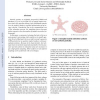Free Online Productivity Tools
i2Speak
i2Symbol
i2OCR
iTex2Img
iWeb2Print
iWeb2Shot
i2Type
iPdf2Split
iPdf2Merge
i2Bopomofo
i2Arabic
i2Style
i2Image
i2PDF
iLatex2Rtf
Sci2ools
SMI
2006
IEEE
2006
IEEE
Fast Sampling of Implicit Surfaces by Particle Systems
Particle systems, as originally proposed by Witkin and Heckbert [17], are a powerful way to sample implicit surfaces since they generate almost evenly distributed samples over the surface, thanks to a global minimization of an energy criterion. Nonetheless, due to the computational cost of the relaxation process, the sampling process becomes rather expensive when the number of samples exceeds a few thousands. In this paper, we propose a technique that only relies on a pure geometry processing which enables us to rapidly generate the set of final particles (e.g., half a second to generate 5,000 particles for an analytic implicit surface) with nearoptimal positions. Because of its characteristics, the technique does not need the usual split-and-death criterion anymore and only about ten relaxation steps are necessary to get a high quality sampling. Either uniform or non-uniform sampling can be performed with our technique.
Related Content
| Added | 12 Jun 2010 |
| Updated | 12 Jun 2010 |
| Type | Conference |
| Year | 2006 |
| Where | SMI |
| Authors | Florian Levet, Xavier Granier, Christophe Schlick |
Comments (0)

